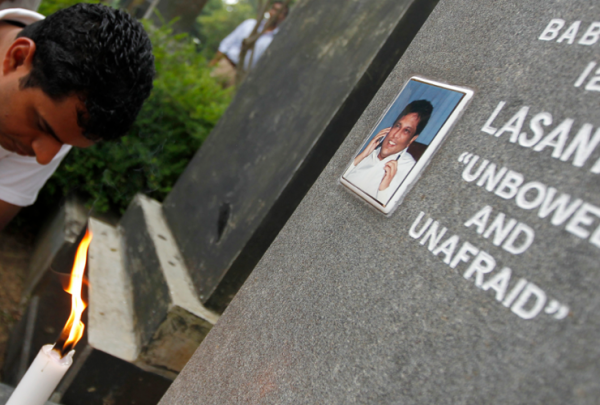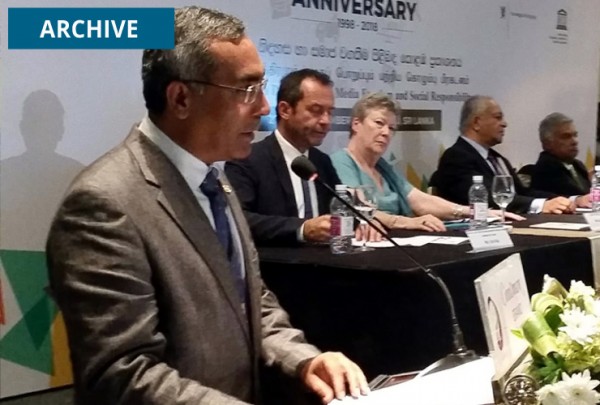The International Press Institute (IPI) today expressed concern at press freedom restrictions imposed by the Sri Lankan government, in particular the blockage of the Colombo Telegraph and other news websites in Sri Lanka.
“Sri Lanka must ensure that the website of the Colombo Telegraph and other news websites are not blocked in the country, as this represents an unacceptable form of pre-publication censorship,” IPI Press Freedom Manager Barbara Trionfi said.
The Colombo Telegraph, run by a group of exiled journalists, is a frequent target of authorities in Sri Lanka and has been periodically blocked in the country since 2011, most recently starting last month. According to a Feb. 20 Colombo Telegraph article, Sri Lanka’s Telecom Regulatory Commission (TRC) “officially issued instructions to mobile service providers to block Colombo Telegraph and other critical websites on its servers, with a warning that the companies are to maintain to customers that the inability to view the sites on the networks were merely ‘technical’ problems’ ”.
However, the Colombo Telegraph reported that TRC Director General Anusha Palpita has repeatedly denied blocking the Colombo Telegraph and other websites.
In an open letter to the U.N. Special Rapporteur on freedom of expression, Frank La Rue, and members of the U.N. Human Rights Council, IPI Executive Director Alison Bethel McKenzie called on them to “do everything in [their] power to ensure that the interference with the Colombo Telegraph and other news websites ends, and that the government respects its international commitments to press freedom”.
In the letter, Bethel McKenzie described the current situation as “a serious violation of people’s right to access a broad range of information and opinions” and she said that the establishment of an environment in which people enjoy unfettered access to information and opinions would represent “an important step in Sri Lanka’s much-needed reconciliation process”.
__________
Vienna, March 25, 2014
Open letter on the blockage of the Colombo Telegraph’s website in Sri Lanka
To the attention of:
Mr. Frank La Rue, UN Special Rapporteur on the promotion and protection of the right to freedom of opinion and expression;
Members of the UN Human Rights Council
Office of the United Nations High Commissioner for Human Rights
Human Rights Council Branch
Palais des Nations
CH-1211 Geneva 10, Switzerland
Your Excellencies,
The International Press Institute (IPI), the global network of editors, media executives and leading journalists in more than 120 countries, would like to call your attention to press freedom restrictions imposed by the Sri Lankan government. In particular, we are concerned about the ban imposed on the Colombo Telegraph, an on-line newspaper, and other news websites that are being blocked in Sri Lanka. We believe these actions represent a serious violation of people’s right to access a broad range of information and opinions.
According to IPI’s sources, the website of the Colombo Telegraph, run by a group of exiled journalists, is frequently targeted by the authorities in Sri Lanka and has been periodically blocked in the country since 2011, most recently starting in February 2014. According to a Feb. 20 Colombo Telegraph article, Sri Lanka’s Telecom Regulatory Commission (TRC) “officially issued instructions to mobile service providers to block Colombo Telegraph and other critical websites on its servers, with a warning that the companies are to maintain to customers that the inability to view the sites on the networks were merely ‘technical’ problems.”
The article further explained that “the Colombo Telegraph is no longer available on Dialog and Etisalat networks and is regularly blocked on SLT and Mobitel servers.” The editor, Uvindu Kurukulasuriya, told IPI that he has reason to believe the government has no intention of lifting the ban.
Sri Lanka still endures the consequences of a civil war that lasted almost three decades and the human rights situation in the country has been the subject of criticism by the UN Human Rights Council. According to IPI’s sources, intimidation and other tactics employed by the Sri Lankan government during and after the conflict forced many journalists to flee the country and has led to widespread self-censorship among media still operating in the country. Furthermore, in their 2012 submission to the UN Universal Periodic Review of Sri Lanka, the freedom of expression organisation ARTICLE 19 and Mr. Kurukulasuriya highlighted that “media diversity and press freedom are under threat in Sri Lanka where affiliates of the president appear to be buying newspapers that criticise the government, in order to censor them.”
Launched in 2011, the Colombo Telegraph is an entirely volunteer-based news website covering Sri Lankan matters and aims to re-enforce free and independent media in the country. With more than one million page views per month, it has achieved considerable popularity. Run by a group of exiled journalists, the news website covers mostly issues which are underreported within the country.
We firmly believe that allowing people unfettered access to information and opinions would not only show Sri Lanka’s commitment to human rights, but would also represent an important step in Sri Lanka’s much-needed reconciliation process. It is therefore essential that people in Sri Lanka have access to a broad array of media, including the Colombo Telegraph. Furthermore, it is vital that Sri Lanka ensures justice in the numerous crimes against journalists committed in the past decades, including the murder of Sunday Leader editor and IPI World Press Freedom Hero, Lasantha Wickrematunge.
We urge you to do everything in your power to ensure that the interference with the Colombo Telegraph and other news websites ends, and that the government respects its international commitments to press freedom.
Sincerely,
Alison Bethel McKenzie
Executive Director


